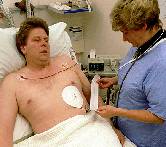October 2, 2014


Latest Heart News
TUESDAY, Sept. 30, 2014 (HealthDay News) — Young and middle-aged heart attack survivors are more likely to have poor health and low quality of life if they have fewer family and friends to support them in their recovery, a new study suggests.
The study included more than 3,400 survivors, aged 18 to 55, who were assessed immediately after their heart attack and again one month and 12 months later.
The first assessment found that patients with low social support were more likely to be single, unemployed, live alone, smoke, abuse alcohol and to have heart risk factors such as high blood pressure, diabetes and depression.
One and 12 months after a heart attack, patients with low social support tended to have poorer mental health, more symptoms of depression and lower quality of life, according to the study published Sept. 30 in the Journal of the American Heart Association.
The findings are consistent with previous studies of older heart attack patients, and suggest the need for new ways of helping heart attack survivors.
“Studies like this are opening up a wide list of different types of risk factors than the ones we conventionally think about,” senior study author Dr. Harlan Krumholz, director of the Center of Outcomes Research and Evaluation at Yale-New Haven Hospital in Connecticut, said in a journal news release.
“We shouldn’t just be concerning ourselves with pills and procedures. We have to pay attention to things like love and friendship and the context of people’s lives. It may be that these efforts to help people connect better with others, particularly after an illness, may have very powerful effects on their recovery and the quality of their lives afterwards,” Krumholz said.
Lead researcher Emily Bucholz, a student in the school of medicine and the department of chronic disease epidemiology in Yale’s School of Public Health, said that “this study adds to current literature by showing that there may be some utility in being able to identify patient support networks when patients are first hospitalized for heart attack.”
Although the study found an association between social support and health outcomes after a heart attack, it did not prove a cause-and-effect relationship.
— Robert Preidt
 Copyright © 2014 HealthDay. All rights reserved.
Copyright © 2014 HealthDay. All rights reserved.
SOURCE: Journal of the American Heart Association, news release, Sept. 30, 2014
![]()